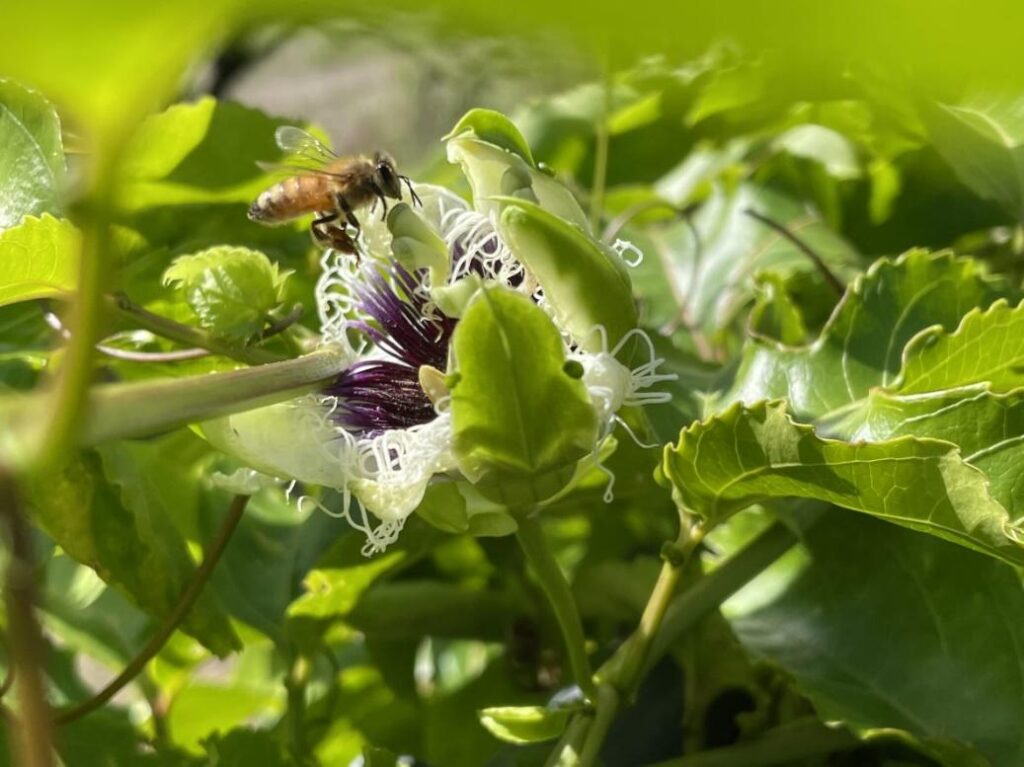Youths to Learn Why Bees Are So Important
by LUIS R. RODRIGUEZ, Small Farms Agent, UF/IFAS Extension Polk County,
& SHREEMOYEE GHOSH, 4-H Youth Development Agent, UF/IFAS Extension Polk County
Beekeeping, also known as apiculture, is the practice of maintaining bee colonies to achieve desired objectives. Honeybees are the most common domesticated bee species. They are social insects that live in large colonies that include a single adult queen bee and thousands of female worker bees, whose numbers change with the seasons, according to the U.S. Food and Drug Administration.
Why keep the bees? Bees play a vital role in both natural and agricultural ecosystems. Besides their valuable and healthy products, bees and other pollinators like butterflies help in pollinating approximately three-quarters of plants that produce about 90% of world food. (“What is Beekeeping”- James Bailey)
Pollination
Pollination is essential for the reproduction of plants. Some plants are self-pollinated (example: cabbages, broccoli, and cauliflower), others are pollinated by wind, while others are pollinated by water (Example: many aquatic plants). Nevertheless, most plants are fertilized by pollen carried by pollinators. Pollinators are any animals that help to bring pollen from the male part of flowers called the stamen, to the female part of the flowers called stigma. In the world, more than 85% of all the flowering plants are fertilized by pollinators, including mammals and birds, but primarily by insects such as bees, butterflies, moths, beetles, flies, and wasps. It is through the pollination process that we propagate vegetables, fruits, and other crops. Without pollinators, agriculture, as we know it today, wouldn’t exist.
The Western Honeybee
Among all these pollinators, the Western Honeybee (Apis mellifera), also known as the European honeybee, is the most important species. Even though there are more than 300 different species of bees in Florida, the Western Honeybee pollinates approximately 85% of all crops in the state. Beekeepers in Florida play an important role by providing pollination services to farmers across the state. Florida has approximately 3,000 registered beekeepers (commercials and hobbyists), with approximately 400,000 colonies in total. The state, which produces 10 to 20 million pounds of honey every year, ranks in the top 10 states for honey production.
Native Bees
Bees are not just important for agriculture but for nature in general. As mentioned before, Florida has more than 300 native bee species that help with the ecosystem. These bees help in the pollination process of wild plants as well as landscape plants. Native bees vary widely in color, size, shape, and behavior. Some of these bees are solitary and do not create colonies like the Western Honeybee. Native bees include sweat bees, leafcutter bees, mason bees, bumblebees, carpenter bees, long-hornet bees, mining bees, plasterer bees, and cuckoo bees.
Plants that Attract Native Bees
Using native plants, we can attract native bees and other pollinators into our landscapes. Plants that have flowers with yellow, white, and blue-purple colors, highly attract native bees. Examples of these plants are Black-Eyed Susan (Rudbeckia hirta), which have yellow flowers; Chickasaw Plum (Prunus angustifolia), which have white flowers; and Wild Petunias (Ruellia spp.), which have blue flowers.
Conclusion
Pollination is an essential process for agriculture and the ecosystem. Without pollinators, it would be difficult to propagate plants either for fruits and vegetable production, or for ornamental plants. In order to put food on our tables and have a beautiful landscape, it is our responsibility to protect these pollinators.
So, what’s all the buzz about?
Come join us at our day camp, “Buzzing With Bees,” from 9 a.m. to 4:30 p.m. on March 24 at UF/IFAS Extension Polk County-Stuart Building. It is geared toward youth ages 8 to 13 years, but all youth between the ages of 8 and18 years are welcome. Some of the topics that we will cover include bees and their biology, cooking with honey, honey production, DIY bee hotel crafts, honey tasting, careers in beekeeping, and much more. There is a $10 fee associated with the day camp and would include lunch and other camp materials. Registration is through 4honline for all 4-H youth and for non 4-H youth, please call the office at 863-519-1041. This program is a UF/IFAS Extension program, which is “An Equal Opportunity Institution.”

